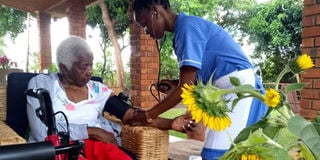Shamim has learnt how to relate with patients

Routine. Shamim Kabonesa checks the blood pressure of Hilda Ellis Rolle, one of her patients during a routine visit recently. PHOTO by EDGAR R. BATTE
What you need to know:
- On average, she earns Shs600,000 per month. This is determined by the number of patients and volume of work that she does in a particular month.
- Many people just find themselves in certain professions but they find themselves gelling in and loving them.
Shamim Kabonesa effortlessly smiles as she engages Hilda Ellis Rolle, an elderly woman in her 70s, in a chit chat.
The two chat through the evening before walking back to a shed in a section of Rolle’s home.
Kabonesa is here on another home treatment schedule that involves going into patients’ homes such as Rolle’s.
“She is a kind and generous young woman. I enjoy her presence. I always look forward to her visits. I have been with her for all this long and I find her patient. She is a lovely person. I would recommend her to any person who needs a nurse,” Rolle, a retired teacher who suffered a stroke, says.
Kabonesa works as a nurse with Bedside Services and her schedule depends on the condition of the patient.
“I often get late night calls with the person [patient or helpers] on the other side of the line asking me to go and attend to them. These are patients that have developed a special attachment to me. And they only feel comfortable when I am the one attending to them,” she says.
On her line-up, Kabonesa attends to patients such as Rolle, who need 12-hour attention and other need minute-by-minute checks.
On the job
Her work involves close personal contact extending to hygiene, drug administration, helping patients bathe, timely feeding and monitoring, among others.
She also offers physiotherapy services such as patient bed turns, sitting positions and walking exercises, among others.
Such is the story of Kabonesa’s job that highlights the challenges that young people go through as they go about their work.
“Looking after patients, especially elderly ones is not an easy task. You have to be patient and attentive 24/27. Anything can happen in a very short time,” she says.
After finishing high school, Kabonesa’s parents did not have enough money to push her through university.
Her only option was to enrol in Kabale School of Comprehensive Nursing where she obtained a certificate in 2014.
She went on to undertake internship and training at Old Kampala Hospital before getting a job as a nursing officer at Bedside Services.
However, she soon came face-to-face with the realities of the job as she found it difficult to get along with the needs of patient.
“My first patient was an elderly woman. It was hard for me perhaps because of the age difference and condition she was in,” Kabonesa says.
However, with time she learnt to deal with patients and she has cultivated a good relationship with many patients opening up to her about their lives some of which involve secrets buried within them.
“I pay attention to health care ethics. I think that is why many patients find it easy to share their life stories with me,” she says.
Kabonesa draws her motivation from her childhood experience as she often fell sick.
However, beyond this, she has always been a good performer especially in regard to science subjects.
Science was her best done subject in Primary Leaving Examinations, which boosted her leaning towards the medical profession.
On average, she earns Shs600,000 per month. This is determined by the number of patients and volume of work that she does in a particular month.
“When I had just started working, in 2014, I used to earn Shs10,000 per day. After a year, the pay improved. Now I get paid Shs20,000 per day,” she says.
Kabonesa, 24, is the last born in a family of five brothers and seven sisters from Kabale District.
SHAMIM KABONESA’S TWO CENTS
Inspiring advice
Kabonesa’s mother has always stood by her amid challenges, which as she says, inspires her on to become better. “My mother always tells me that as I go to work every morning, I should always remember that my dream is bigger than where I am at the moment. She tells me to think about upgrading my studies to another level,” she says.
Advice to young people
According to Kabonesa, failing to go to university is not the end of the world. There are many avenues, she says, through which you can make it in life. “Going to university or a higher institution of learning only gives you some form of direction. I am not saying that going to university is bad but you should never be held back by circumstances. There are so many other ways and affordable institutions that can deliver you to a desirable life.”
Do what you are comfortable with
Many people just find themselves in certain professions but they find themselves gelling in and loving them. Therefore, according to Kabonesa you should do what you love. “I have seen many people do plumbing and mechanics, among others. These people get their jobs done and develop faster than they would have if they had got into other jobs. So find comfort in what you do and be good at it,” she says.




